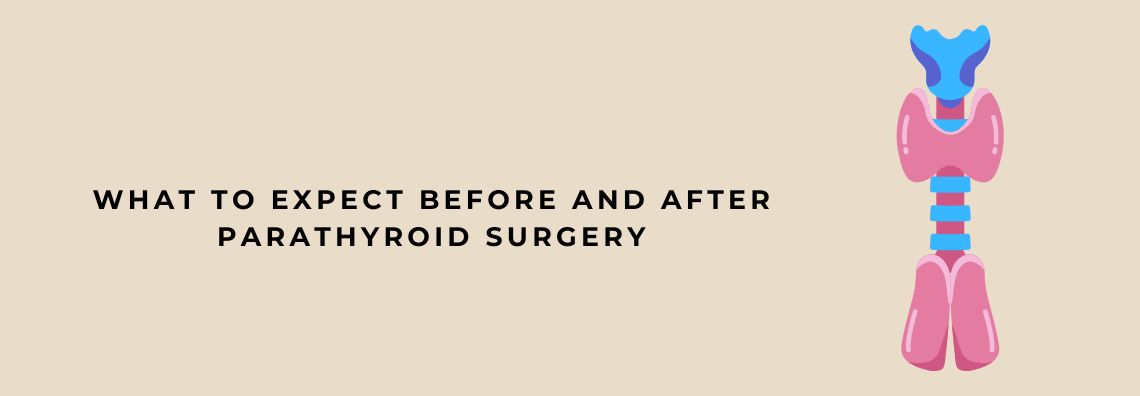
Parathyroidectomy or parathyroid surgery refers to removal of one or more parathyroid glands. Healthcare providers use this procedure to treat primary hyperparathyroidism. They may also recommend this surgical procedure to treat secondary hyperparathyroidism when non-surgical treatment doesn’t work.
Parathyroid surgery is a surgical removal of one or more parathyroid glands. These parathyroid glands, located on the back of your thyroid, help regulate the levels of calcium in your blood. Most people have four parathyroid glands, but rarely a person can have more, fewer or none.
When One Might Need Parathyroid Surgery?
Parathyroidectomy is typically recommended when one or more parathyroid glands produce too much parathyroid hormone (PTH), leading to elevated blood calcium levels. This issue can manifest symptoms like kidney stones, bone density loss, muscle weakness and fatigue. This usually occurs due to a benign tumour on the gland and is most often considered when blood calcium levels are significantly above normal even if symptoms are mild. Here are some points that can highlight when one might need a parathyroid surgery:
- When blood calcium levels are consistently above the normal range, especially if accompanied by other symptoms like kidney stones or bone pain.
- Presence of multiple or large kidney stones, potentially linked to high calcium levels.
- If your bone density scans show significant bone loss, indicating a high risk of fractures.
- When kidney function is impaired due to high calcium levels.
Understand what to expect before and after parathyroid surgery.
Parathyroid Surgery: What To Expect Before The Surgical Procedure?
Before your parathyroid surgical procedure, you can expect to undergo a series of tests and evaluations to ensure you are healthy enough for the procedure. You may also expect changes in diet and taking certain medications before surgery. Here is the list of tests and considerations:
- One can expect blood test, laryngoscopy, EKG, chest X-ray, physical exam or imaging before the procedure. All these are necessary to help the practitioner locate your parathyroid glands, evaluate your vocal cords, heart and lung function. These tests help evaluate your overall health and ensure you are good to go with the surgical procedure.
- You may need to meet with an endocrine specialist to learn more about the procedure. They may recommend changes in lifestyle and an exercise routine. These changes will make the healing procedure better, but firstly, they can effectively work to make the procedure successful.
- You need to tell your practitioner about any medications, supplements or herbs you take to let them recommend changes and proceed with the procedure without further complications.
- You need to get clearance from your medical expert if you have a history of significant cardiac or pulmonary conditions.
Women who are expecting need to inform the medical expert before the procedure, now, moving ahead with that to expect after the procedure.
Parathyroid Surgery: What To Expect After The Surgical Procedure?
You can expect to go the same day after the parathyroid surgery, but other things to expect after the procedure involve a sore throat, mild discomfort at the incision site and taking calcium supplements temporarily to manage potential low calcium levels. Here are the key points to remember after parathyroid surgery:
Pain Management
A sore throat is the most common complaint people have after the procedure, usually managed with over-the-counter pain medication; one might feel some discomfort at the incision site.
Calcium Monitoring
Your healthcare professional will closely monitor your blood calcium levels and may prescribe calcium supplements to prevent temporary low calcium levels, which can cause symptoms like tingling or numbness around the mouth.
Diet
You can usually eat normally after the procedure, but some may prefer soft foods initially due to throat discomfort.
Voice Changes
Temporary scratchy or weak voice may occur due to the surgery’s proximity to the vocal cords, but this usually resolves quickly.
Incision Care
Keep the incision clean and dry, following your healthcare professional’s instructions on dressing changes.
Changes in diet, incision care and pain management are the common expectations after any surgical procedure. You must consult an endocrinologist in Brisbane or search for “Endocrinologist Brisbane” for better and professional advice.
Conclusion
A person expecting to go under the parathyroidectomy or parathyroid surgery can expect a few tests before the procedure. These tests are necessary to evaluate your overall health and ensure the procedure doesn’t invite complications. Few dietary changes and medical changes can be expected, your healthcare professional will guide you through.
After the procedure, dietary changes will be recommended and incision care is necessary. You can consult your medical expert about any doubts you are having before and after the procedure.